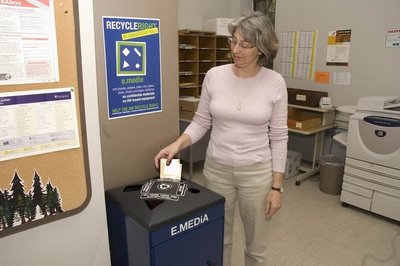April 26, 2007
UW Recycling: Now you can recycle used electronic media, too
In the beginning, the UW only recycled paper and aluminum cans. But over time that list has expanded, and now some new items have been added. Last week, the first “E.Media” recycle bins were installed to collect used electronic media — items such as CDs, DVDs, tapes, cell phones and ink jet cartridges — as well as batteries.
UW Recycling is in the process of redesigning several blue bins that used to be reserved for newspapers to accommodate the new items. Each bin will now be divided into four compartments, one for each type of media. With the items separated, Recycling Manager Pat Kaufman says, it’s easier for the department to accumulate enough of each to make recycling them economically feasible.
The first three of the blue bins have been installed in Anderson, Bloedel and Winkenwerder halls, the buildings that are part of the College of Forest Resources. Those buildings were chosen for the kickoff, Kaufman says, because Forest Resources showed early interest in electronic media recycling. Last spring, Angel Ratliff, a student in the college, took the initiative in arranging for private pickup of media before learning that UW Recycling was already in the process of creating a program for those items.
Twenty bins are being prepared for E.Media recycling and will be installed over the next month. Kaufman says that locations for these bins are dispersed across campus to provide a convenient bin for everyone. Click here for a list of planned bin locations.
A fourth bin of a different type has been installed in the first floor of the HUB, near the candy counter. It is stainless steel, with a pointed top and separate compartments for the different types of media. This bin, Kaufman says, is sturdier, with a locking door. It is being given a trial at the HUB and may later be used in heavily populated areas such as residence halls and food courts.
The E.media bins accept batteries, in addition to electronic media, and will replace the current plastic tubs provided by Environmental Health and Safety for battery recycling.
Items in the bins will be picked up by UW Recycling weekly. The batteries, which are considered a “universal waste” item, will go to EH&S, and eventually to a facility that recycles the metal. Cell phones and PDAs will go first to surplus property for possible resale before being turned over to an outside vendor. The other items will go directly to an outside vendor; the vendor will then sell them to the recycler who is the highest bidder.
“People should not put items containing confidential information in the bins, because we can’t guarantee that the material will be destroyed,” Kaufman says. “Anyone who has such items can call us and we’ll connect them with a company that shreds them prior to recycling. People can also call us if they have an unusually large amount of material — such as recordings from a research project.”
Material that is recycled not only benefits the environment, but also saves the University money, Kaufman says. In most cases, the outside vendor picks up the material for free and returns some of its resale value to the University. Even when the University does pay to have recyclables hauled away, as it does with wood waste, it pays only $20 per ton for those services, compared to $199 a ton for landfill-bound garbage.
“From our point of view,” Kaufman says, “any recyclable material we can keep out of the waste stream saves us money.”

